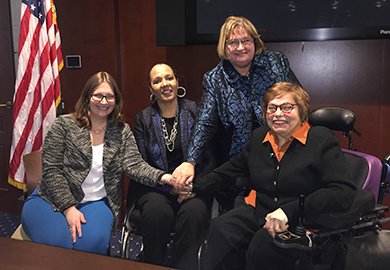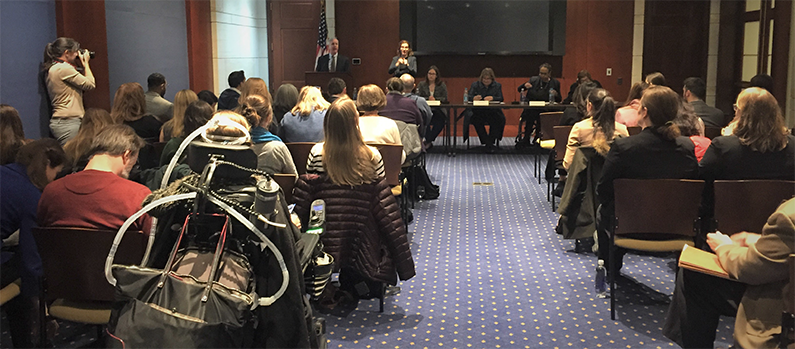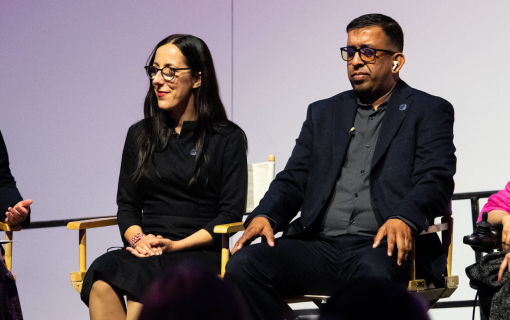
Leveraging American Leadership to Strengthen International Disability Rights
On January 9, 2019, the International Foundation for Electoral Systems (IFES) and the United States International Council on Disabilities (USICD) co-hosted “Promoting American Interests Through International Disability Rights: Recommendations for the New Congress.”
The event featured remarks by Congresswoman Dina Titus and IFES President and CEO Anthony Banbury and was moderated by IFES Inclusion Advisor Virginia Atkinson. Panelists included Judith Heumann, international disability rights advocate; Isabel Hodge, executive director of USICD; and Charlotte McClain-Nhlapo, global disability advisor at the World Bank Group.
The panelists discussed how the 116th Congress can leverage American policy and leadership to strengthen disability rights worldwide. They provided an overview of disability policy in international development and highlighted good practice examples for disability inclusion from around the world. The panelists emphasized how many constituents are impacted by disability, highlighting the increased prevalence of disabilities among veterans, the aging and women. The panelists also discussed the role the special advisor for international disability rights for the U.S. Department of State has played in promoting disability rights worldwide and explored transferable lessons from the World Bank’s new disability framework. The panelists concluded with a series of recommendations for the new Congress on how to increase U.S. leadership on international disability rights.
Key recommendations from the event include:
- Members of Congress and their staff should meet in Washington, D.C. and in their districts with disabled people’s organizations (DPOs), particularly those with an international focus.
- Members and their staff should meet with international nongovernmental organizations (NGOs) on disability inclusion.
- When congressional delegations travel abroad, they should request meetings with DPOs to learn about conditions and ask questions to inform their work. Delegations meeting with foreign governments should include disability as a subject of interest. Staffers should read the United Nations Convention on the Rights of Persons with Disabilities report for that country in advance of travel and prep members accordingly.
- U.S. lawmakers should engage with and explore transferable lessons from other national governments, such as the United Kingdom and Australia, that demonstrate a commitment to including persons with disabilities in all aspects of international development.
- Congress should hold a hearing on international disability rights to expand knowledge and inform policymaking.
- When other congressional hearings are being conducted, members should be encouraged to ask questions about disability, especially when gender, aging, health care, including the President's Emergency Plan for AIDS Relief, wounded warrior and veterans, infrastructure, education, and democracy and governance are being discussed.
- Congressional staff should be trained on disability rights and inclusion in international development, as relevant to their committee assignments.
- During nomination hearings, members of Congress should ask questions related to disability.
- The appointment of an ambassador-level position for international disability rights at the Department of State and a senior disability coordinator at the U.S. Agency for International Development (USAID) should be codified and encouraged with the appropriate level of staffing, travel, reasonable accommodations and funding for grantmaking.
- A new policy on disability inclusive development should be developed for USAID – the first and last policy was in 1997.
- All Department of State and USAID grants should be made disability-inclusive and include the development of a monitoring mechanism to track progress.
- The Department of State and USAID’s integration of disability across their grants, policies, contracting and hiring should be reviewed.
- A high-level disability rights position within the Office of U.S. Foreign Disaster Assistance should be established to ensure the U.S. Government’s response to disasters overseas is disability-inclusive.
- An International Disability Rights Committee under the Federal Advisory Committee Act should be established and led by representatives from DPOs and NGOs with international disability rights missions.
- An annual report to the House Foreign Affairs Committee and Senate Foreign Relations Committee should be required, evaluating how disability is being integrated across the Department of State and USAID.
IFES and USICD reiterated that they are available as resources for members of Congress and their staff upon request. For more information, please contact IFES Senior Congressional Liaison Liz Sidell at esidell@ifes.org. Click here for a photo gallery of this event.












